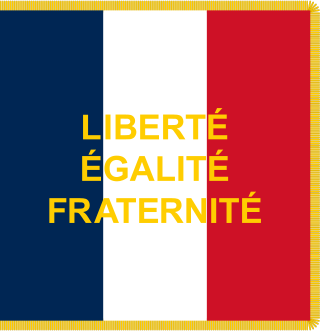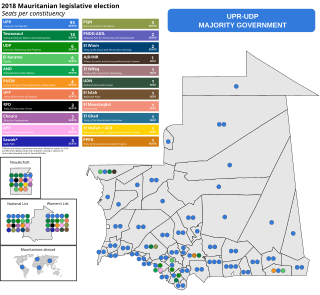 |
|---|
|
Territorial Assembly elections were held in Mauritania on 30 March 1952. [1] The result was a victory for the Mauritanian Progressive Union, which won 22 of the 24 seats. [2]
 |
|---|
|
Territorial Assembly elections were held in Mauritania on 30 March 1952. [1] The result was a victory for the Mauritanian Progressive Union, which won 22 of the 24 seats. [2]
The Territorial Assembly was elected by two colleges; the first college elected 8 members and the second 16. [3]
| Party | First College | Second College | Total seats | |||||
|---|---|---|---|---|---|---|---|---|
| Votes | % | Seats | Votes | % | Seats | |||
| Mauritanian Progressive Union | 31,644 | – | 12 | 12 | ||||
| Mauritanian Entente | 10,937 | – | 1 | 1 | ||||
| Union for the Defence of Mauritania and the French Union | 277 | 5 | 5 | |||||
| French Union | 183 | 3 | 3 | |||||
| Other parties | 0 | 0 | 0 | |||||
| Independents | 5,697 | – | 3 | 3 | ||||
| Total | 8 | 16 | 24 | |||||
| Total votes | 647 | – | 61,597 | – | ||||
| Registered voters/turnout | 1,020 | 63.43 | 130,441 | 47.22 | ||||
| Source: De Benoist [1] | ||||||||

French West Africa was a federation of eight French colonial territories in West Africa: Mauritania, Senegal, French Sudan, French Guinea, Ivory Coast, Upper Volta, Dahomey and Niger. The federation existed from 1895 until 1958. Its capital was Saint-Louis, Senegal until 1902, and then Dakar until the federation's collapse in 1960.

The French Community was the constitutional organization set up in 1958 between France and its remaining African colonies, then in the process of decolonization. It replaced the French Union, which had reorganized the colonial empire in 1946. While the Community remained formally in existence until 1995, when the French Parliament officially abolished it, it had effectively ceased to exist and function by the end of 1960, by which time all the African members had declared their independence and left it.
This electoral calendar 2007 lists the national/federal direct elections held in 2007 in the de jure and de facto sovereign states and their dependent territories. Referendums are included, although they are not elections. By-elections are not included.

The National Assembly is the unicameral legislative house of the Parliament of Mauritania. The legislature currently has 157 members, elected for five-year terms in electoral districts or nationwide proportional lists.

The Mauritanian Parliament (Barlamane/Parlement) is composed of a single chamber, the National Assembly. Composed of 157 members, representatives are elected for a five-year term in single-seat constituencies.

The current Constitution of Mauritania was adopted on 12 July 1991. There have been several constitutions since Mauritania's independence in 1960.

The period from the mid-nineteenth to mid-twentieth centuries is the colonial period in Mauritania.

Mauritania, officially the Islamic Republic of Mauritania, is a sovereign country in Northwest Africa. It is bordered by the Atlantic Ocean to the west, Western Sahara to the north and northwest, Algeria to the northeast, Mali to the east and southeast, and Senegal to the southwest. Mauritania is the 11th-largest country in Africa and the 28th-largest in the world, and 90% of its territory is situated in the Sahara. Most of its population of 4.4 million lives in the temperate south of the country, with roughly one-third concentrated in the capital and largest city, Nouakchott, located on the Atlantic coast.

Elections for the Territorial Assembly were held in French Dahomey on 30 March 1952. Sourou-Migan Apithy's Republican Party of Dahomey won 19 of the 32 second college seats. Only ten members of the Legislative Council elected in 1947 were re-elected.

Parliamentary elections were held in Mauritania on 17 May 1959. The result was a victory for the Mauritanian Regroupment Party, which was the only party to contest the elections, thereby winning all 40 seats in the National Assembly. Voter turnout was 90.3%.

Presidential elections were held for the first time in Mauritania on 20 August 1961 to elect the President for the next five years. Moktar Ould Daddah, who had been acting head of state since independence from France in 1960 was the only candidate, and was elected unopposed. Although he was a member of the ruling Mauritanian Regroupment Party, his candidacy was also supported by the Mauritanian National Union. Voter turnout was 93.6%.

General elections were held in Mauritania on 8 August 1971 to elect a President and National Assembly, the first time the two elections had been held together. At the time, the country was a one-party state with the Mauritanian People's Party (PPM) as the sole legal party. Its leader, incumbent President Moktar Ould Daddah, was the only candidate in the presidential election, and was re-elected unopposed to a third term in office, whilst the PPM won all 50 seats in the National Assembly election. Voter turnout for the parliamentary election was reported to be 95.6%.

Elections to the French National Assembly were held in Mauritania on 17 June 1951. Mauritania had one seat in the Assembly, which was won by Sidi el-Mokhtar N'Diaye, a member of the Mauritanian Progressive Union. He defeated the incumbent, Horma Ould Babana, who had been elected as a member of the French Section of the Workers' International in the last election, but had since gone on to leave the SFIO and form his own party, the Mauritanian Entente.
Elections to the French National Assembly were held in the constituency of Mauritania–Senegal on 21 October 1945 as part of the wider parliamentary elections. Two members were elected from the seat, with the winners being French Section of the Workers' International (SFIO) candidates Lamine Guèye and Léopold Sédar Senghor.

Territorial Assembly elections were held in Mauritania on 31 March 1957. The result was a victory for the Mauritanian Progressive Union, which won 33 of the 34 seats. The other seat was won by an independent candidate in the Baie du Levrier constituency.

The Mauritanian Progressive Union was a political party in pre-independence Mauritania.

Territorial Assembly elections were held in French Upper Volta on 30 May 1948, with a second round on 20 June. They were the first elections to the new Territorial Assembly, which had been created following the separation of Upper Volta from Ivory Coast the previous year.

Territorial Assembly elections were held in Niger on 30 March 1952. The Union of Nigerien Independents and Sympathisers won 34 of the 35 seats in the Second College.

Parliamentary elections was held in Mauritania in September 2018; the first round took place on 1 September, with a second round held on 15 September. At the national level, elections were held in 157 constituencies, each electing one member to the National Assembly. Elections were also held in 13 regional councils and 219 municipalities.

Parliamentary elections will be held in Mauritania on 13 and 27 May 2023, alongside regional and local elections.